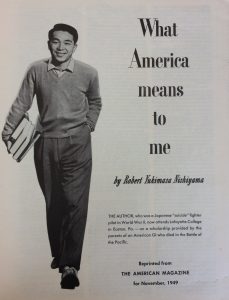What America Means to Me–Robert Yukimasa Nishiyama
For this blog, I chose “What America means to me” by Robert Yukimasa Nishiyama. I thought this was an incredible story that highlighted the values of altruism, forgiveness, and open-mindedness. Nishiyama’s narrative that was published in the American Magazine (1949) highlighted not only the incredible chance he had been given but also how one’s culture shapes ways of thinking. In the pages that I read, he contrasted Japanese and American ideology quite frequently, especially when it came to the war. He apparently talked to many Americans who were soldiers or prisoners of war in WWII, who interacted with some Japanese soldiers whom they hated, and some that they got along with quite well. In Japan, soldiers were taught to hate all Americans equally, and to not make distinctions between them. He also says that our education system was quite different from Japan’s, where he says college was like the army. At Lafayette, he found that professors and students debated and questioned each other, which would never happen in Japan.

Although it was a very moving and wonderful story, it did remind me a bit of propaganda. I don’t wish to seem too harsh, but I felt that the source may not have been able to portray a full picture of Nishiyama’s experience in the U.S. According to him, all Americans were friendly and welcoming, and he didn’t receive any hatred or racial prejudice from them, despite being a trained kamikaze pilot from the enemy side of a war that ended just a few years ago. Although I don’t doubt that Nishiyama had a good experience at Lafayette, thanks to Robert Johnstone, think that because he was writing this piece for an American magazine, he may have construed it to be a bit more positive than was in reality. Another limitation to this source was the fact that it wasn’t a direct account from him. Being a magazine article, it was likely to have been edited and scrutinized by many people before it was allowed to be published.
In all though, I think it supports Connerton’s “How societies remember” because it really demonstrates how our culture teaches us to think and act–and when placed in a different culture, through war or an incredible scholarship opportunity, we become more aware of these differences than ever before.
Leave a Reply